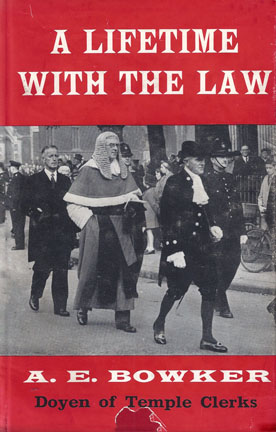
Outof Print
A. E. Bowker, doyen of Temple Clerks, has had in his care a Lord Justice of Appeal, a High Court Judge, three County Court Judges, five Recorders, one Stipendary Magistrate, one Official Referee, and the Chief Registrar of the Probate, Divorce and Admiralty Division.
Included in this list are ten of Her Majesty's Counsel, all of whom, with the exception of Sir Edward Marshall Hall, took silk when Mr. Bowker was their Senior Clerk, largely responsible for the acceptance of briefs, the fixing of fees, and the guidance of careers.
The late Lord Simon laid it down that the secret of success at the Bar was to possess "a good Clerk and a good digestion." Mr. Bowker's remarkable account of his life in the Temple proves the point and reveals the important part that an experienced Clerk can and does play in distinguished legal careers.
Mr. Bowker was Senior Clerk to Marshall Hall while still in his teens. From the famous chambers at 3, Temple Gardens, in the High Court and in Assize Courts all over the country, he participated behind the scenes in many of the most sensational causes celebres since the turn of the present century.
When Mr. Norman (now Lord) Birkett became head of chambers after the retirement of Marshall Hall, Mr. Bowker acted in the same capacity for him and accompanied him as his Clerk when he was elevated to the Bench as Mr. Justice Birkett.
But this book is not merely the story of the famous Temple Chambers "stable", fascinating though that story is. Mr. Bowker' s memories go back to the time when, as a boy, he was taken into the chambers of Boydel Houghton on the recommendation of Mr. Justice Wills who, it will be remembered, passed the sentence of two years hard labour on Oscar Wilde. From stamp licking there he graduated over the years-nearly sixty in all-towards his most distinguished appointment, that of Marshal at the Nuremberg Trial.
During those years he met and enjoyed the friendship of many of the outstanding legal figures of our time, both on the Bench and at the Bar. His recollections of their characters out of Court, their triumphs and failures, their styles of advocacy and their anecdotes are richly human.
Here, also, are snapshots of famous acquittals on charges of murder, secured by the brilliant advocacy of Marshall Hall and Norman Birkett. Mr. Bowkers pungent comments on Temple life and personalities, and his wise and tolerant judgments on the human side of the law will delight lawyers and general readers alike.